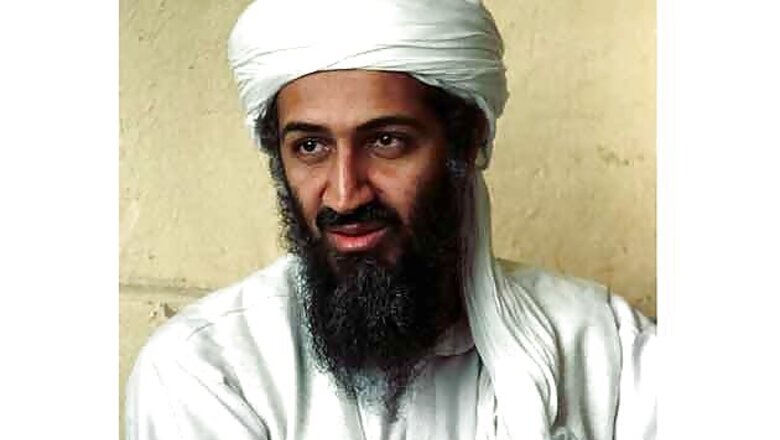
views
New Delhi: It has been a year since the US Navy SEALS stormed into a secret compound in the garrison town of Abbottabad in Pakistan and killed the world's most wanted terrorist, Osama bin Laden.
US President Barack Obama marked the anniversary of the al Qaeda chief's death with a surprise visit to Afghanistan, signing a strategic pact with Kabul on Wednesday and delivering an election-year message to Americans that the war is winding down.
Shortly after arriving under the cover of darkness, Obama and Afghan President Hamid Karzai signed a strategic partnership agreement at the Afghan leader's palace that sets out a long-term US role in Afghanistan, including aid and advisers.
The deal may provide Afghans with reassurances that they will not be abandoned when most NATO combat troops leave in 2014. For Obama, it was an opportunity to draw a line under a war started by his predecessor in response to the September 11, 2001 attacks, but which is now widely unpopular at home.
"My fellow Americans, we have travelled through more than a decade under the dark cloud of war. Yet here, in the pre-dawn darkness of Afghanistan, we can see the light of a new day on the horizon," Obama said in a televised address to the American people against the backdrop of armoured vehicles and a US flag.
"As we emerge from a decade of conflict abroad and economic crisis at home, it's time to renew America," he said. "This time of war began in Afghanistan, and this is where it will end."
Nearly 3,000 US and NATO soldiers have died during the Afghanistan war since the Taliban rulers were ousted in 2001.
Obama visited with troops during a stay of roughly six hours in the country and emphasized bin Laden's demise, an event that his re-election campaign has touted as one of his greatest achievements in office. Obama left Afghanistan on Air Force One shortly after delivering his speech.
"Not only were we able to drive al Qaeda out of Afghanistan, but slowly and systematically we have been able to decimate the ranks of al Qaeda, and a year ago we were able to finally to bring Osama bin Laden to justice," Obama said to cheers.
But even as he asserted in his speech that there was a "clear path" to fulfilling the US mission in Afghanistan and made his strongest claim yet that the defeat of al Qaeda was "within reach," he warned of further hardship ahead.
"I recognise that many Americans are tired of war... But we must finish the job we started in Afghanistan and end this war responsibly," he said at Bagram airbase outside of Kabul, where only months ago thousands of Afghans rioted after US troops accidentally burned copies of the Koran, the Muslim holy book.
The incident plunged already tense relations to their lowest point in years.
While speaking in broad terms of "difficult days ahead," Obama did not address some of the thorniest challenges.
Those include corruption in Karzai's weak government, the unsteadiness of Afghan forces in the face of a resilient Taliban insurgency, and Washington's strained ties with Pakistan where US officials see selective cooperation in cracking down on militants fueling cross-border violence.
Those risks, along with the tactical gains US commanders see in parts of the country, were laid out in a new Pentagon report released on Tuesday.
Obama met Karzai at his walled garden palace in Kabul, where they signed the Strategic Partnership Agreement (SPA). "By signing this document, we close the last 10 years and open a new season of equal relations," Karzai said after the meeting.
Within Afghanistan, the palace signing ceremony was aimed at sending a message to the Taliban and other groups that they cannot wait out 130,000 foreign troops and retake power.
Pakistan still has no answer
One year since US commandos flew into the Pakistani Army town of Abbottabad and killed Osama bin Laden, Islamabad has failed to answer tough questions over whether its security forces were protecting the world's most wanted terrorist.
Partly as a result, fallout from the raid still poisons relations between Washington and Pakistan, where anti-American sentiment, support for Islamist extremism and anger at the violation of sovereignty in the operation can be summed up by a Twitter hashtag doing the rounds: 02MayBlackDay.
The Pakistani government initially welcomed the raid that killed bin Laden in his three-story compound, but within hours the mood changed as it became clear that Pakistan's Army was cut out of the operation. Any discussions over how bin Laden managed to stay undetected in Pakistan were drowned out in anger at what the Army portrayed as a treacherous act by a supposed ally.
That bin Laden was living with his family near Pakistan's version of West Point - not in a cave in the mountains as many had guessed - raised eyebrows in the West. The Pakistani Army was already accused of playing both sides in the campaign against militancy, providing some support against al Qaeda but keeping the Afghan Taliban as strategic allies.
A week after the raid, President Barack Obama said bin Laden had a "support network" in Pakistan and the country must investigate how he evaded capture. Pakistan responded by announcing the formation of a committee to investigate bin Laden's presence in Pakistan as well as the circumstances surrounding the US raid.
Soon after it began its work, the head of the committee said he was sure that security forces were not hiding bin Laden. Other statements since then have also suggested the report will be more of a whitewash than a genuine probe.
Last week, committee spokesman retired Col Mohammad Irfan Naziri said its findings were being written up but they might not be released publicly. We're disappointed," said a US official about the investigation. "They promised to do it, but they haven't yet."
The public line of the Obama administration is that no evidence has emerged to suggest bin Laden had high-level help inside Pakistan. Pakistan's Inter-Service Intelligence agency said bin Laden's long and comfortable existence in the country was an "intelligence failure."
But suspicions have increased following recent disclosures by one of bin Laden's wives in a police interrogation report that the al-Qaeda leader lived in five houses while on the run and fathered four children, two of whom were born in Pakistani government hospitals.
"I just find the idea that he lived in a place like Abbottabad without the ISI's knowledge strains credibility," said Shawn Gregory, director of the Pakistan Security Research Unit at Bradford University in the UK. "It is ridiculous that he wasn't being protected."
Since the raid, Pakistan has tried to close one of the most notorious chapters in its history.
The three-story compound in Abbottabad that housed him for six years was razed by bulldozers in a surprise, nighttime operation. Just last week, his three wives and 11 daughters, children and grandchildren were deported to Saudi Arabia; their side of the story is unlikely to be told anytime soon.
In this relatively wealthy and well-ordered town that has become infamous for hosting bin Laden for so long, it's hard to find anyone prepared to say they supported the American operation. Many don't believe bin Laden ever lived in the house, reflecting the popularity of conspiracy theories in a country where the rulers often obscure the truth.
Umair Ishaq, who grows vegetables close to the empty lot, said he remained angry about the raid.
"You go there to the compound, there is a still a fragrance from those who were killed," he said, referring to Islamic belief that those who die as a martyr to the faith give off a sweet smell at death. "They were innocent and they were martyrs."
Most of the rubble has been hauled away from the site, on which local children now play cricket. Farmers cross over it on their way to the fields, and on a recent day older boys were smashing away at bits of masonry, trying to extract the metal poles inside so they could sell them.
After the helicopter-borne operation, the country's generals retaliated by kicking out US special forces trainers operating close to the Afghan border, cutting intelligence cooperation with the CIA and restricting the travel of foreign diplomats and aid workers.
Authorities arrested a Pakistani doctor who assisted America in tracking down bin Laden. The doctor remains in detention, facing possible treason charges. The country has made not made public the arrests of anyone connected to bin Laden's time on the run.
Relations had barely recovered when in November US airstrikes inadvertently killed 24 Pakistani troops along the Afghan border. Pakistan immediately blocked US and NATO supply routes across its soil into Afghanistan. They remain shut, despite US attempts to renegotiate a new deal with Pakistan.
Even before the raid, anti-American sentiment was so rampant in Pakistan that anyone who opposed Washington was lauded by many sections of society. Bin Laden was no exception, even as his followers carried out numerous bloody attacks inside the country.
"OBL was considered as a hero by the general public at large, and his death generated a lot of sympathy," said Aftab Khan Sherpao, a lawmaker from the northwest who has three times been targeted by Islamist militant suicide bombers. "No one has been able to control and contain his supporters."
Despite reservations about Pakistan's commitment to US goals in Afghanistan and doubts over how bin Laden managed to evade capture for so long, the Obama administration feels it has little choice but to ally itself with the country. Pakistan has nuclear weapons and will remain important in the fight against al Qaeda in years to come.
Many believe Islamabad's cooperation will be essential for getting any Afghan peace deal to stick, allowing the US to withdraw troops.
(With additional information from Reuters and Associated Press)




















Comments
0 comment